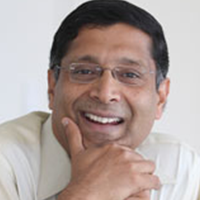Contributor : Profile
Arvind Subramanian is Professor of Economics at Ashoka University. Prior to joining Ashoka University, Subramanian was a Visiting Lecturer at Harvard’s Kennedy School of Government and non-resident Senior Fellow, Peterson Institute for International Economics (PIIE). He is the former Chief Economic Adviser to the Government of India. Previously, he was the Dennis Weatherstone Senior Fellow at the PIIE, Senior Fellow at the Center for Global Development and Senior Research Professor at Johns Hopkins University. He had served at the International Monetary Fund (IMF) since 1992, most recently as Assistant Director in the research department (2004–07). He worked at the GATT (1988–92) during the Uruguay Round of trade negotiations and taught at Harvard University’s Kennedy School of Government (1999–2000). During his career at the Fund, he worked on trade, development, Africa, India, and the Middle East.
Subramanian has written on growth, trade, development, institutions, aid, oil, India, Africa, the World Trade Organization (WTO), and intellectual property. He has published widely in academic and other journals. He is the author of Eclipse: Living in the Shadow of China’s Economic Dominance and other books on climate change, India, and trade. He obtained his undergraduate degree from St. Stephens College, Delhi; M.B.A. from Indian Institute of Management, Ahmedabad, India; and M.Phil. and D.Phil. from the University of Oxford.
Posts by Arvind Subramanian
Everything you know about cross-country convergence is (now) wrong
A quarter-century after the empirical growth literature set out to explain why poor countries are not catching up with rich ones, cross-country regressions have mercifully gone out of fashion. In this...
-
 Dev Patel
Dev Patel  Justin Sandefur
Justin Sandefur  Arvind Subramanian
Arvind Subramanian  15 February, 2019
15 February, 2019
- Articles
Climate change and Indian agriculture
Indian agriculture remains vulnerable to the vagaries of weather, and the looming threat of climate change may expose this vulnerability further. This article presents findings from a study that uses ...
-
 Siddharth Hari
Siddharth Hari  Parth Khare
Parth Khare  Arvind Subramanian
Arvind Subramanian  16 August, 2018
16 August, 2018
- Articles
Coal and the climate change debate
In the run-up to the Paris Climate Summit, there has been a growing call among advanced nations to phase out fossil fuels. In this article, Arvind Subramanian, Chief Economic Adviser, Government of I...
-
 Milind Murugkar
Milind Murugkar  E. Somanathan
E. Somanathan  Arvind Subramanian
Arvind Subramanian  03 December, 2015
03 December, 2015
- Perspectives
India's monetary policy in unusual times, uncharted waters
There is a lot of discussion of the right course of monetary policy for India. In this article, India’s Chief Economic Adviser Arvind Subramanian argues that the country’s real policy interest ra...
-
 Arvind Subramanian
Arvind Subramanian  26 August, 2015
26 August, 2015
- Perspectives
Charting a course for the Indian economy
Karthik Muralidharan (Associate Professor of Economics, University of California, San Diego) speaks with Arvind Subramanian (Chief Economic Adviser, Government of India) on a broad set of issues rang...
-
 Karthik Muralidharan
Karthik Muralidharan  Arvind Subramanian
Arvind Subramanian  05 August, 2015
05 August, 2015
- Videos
Land Shackled - II
Rising land scarcity and land market distortions are increasingly becoming a binding constraint on development in India. In their previous article, Kapur, Somanathan and Subramanian diagnosed India�...
-
 Devesh Kapur
Devesh Kapur  T.V. Somanathan
T.V. Somanathan  Arvind Subramanian
Arvind Subramanian  22 October, 2014
22 October, 2014
- Perspectives
Land Shackled
Rising land scarcity and land market distortions are increasingly becoming a binding constraint on development in India. In the first of a two-part series, Kapur, Somanathan and Subramanian diagnose ...
-
 Devesh Kapur
Devesh Kapur  T.V. Somanathan
T.V. Somanathan  Arvind Subramanian
Arvind Subramanian  17 October, 2014
17 October, 2014
- Perspectives
Is the rupee fairly valued?
Is the rupee fairly valued, and should the RBI allow it to appreciate beyond its current rate? This column analyses new World Bank data and finds that the rupee is persistently undervalued by 30% or ...
-
 Martin Kessler
Martin Kessler  Arvind Subramanian
Arvind Subramanian  27 August, 2014
27 August, 2014
- Articles
India's WTO problem: A proposal
India is threatening to block the WTO Trade Facilitation Agreement unless its agricultural policies are exempted from multilateral scrutiny. This article contends that while India’s objectives on ag...
-
 Arvind Subramanian
Arvind Subramanian  31 July, 2014
31 July, 2014
- Perspectives
Modi's first Budget for India: Disappointing but retrievable
In this article, Arvind Subramanian contends that while Modi’s first Budget was good on vision, it fell short in terms of fiscal adjustment, budgetary transparency and credibility, and specificity ...
-
 Arvind Subramanian
Arvind Subramanian  15 July, 2014
15 July, 2014
- Perspectives
The Jaitley Budget: Planning for crisis
El Nino can potentially derail the best-laid plans of the new government in India. The article contends that the finance minister would do well to plan his first Budget by attaching a reasonable prob...
-
 Arvind Subramanian
Arvind Subramanian  23 June, 2014
23 June, 2014
- Perspectives
Reversing premature de-industrialisation in India
In countries across the world, de-industrialisation is taking place earlier in the development process. This column analyses how India fares in this regard. It finds that for most Indian states, the ...
-
 Amrit Amirapu
Amrit Amirapu  Arvind Subramanian
Arvind Subramanian  26 May, 2014
26 May, 2014
- Articles




